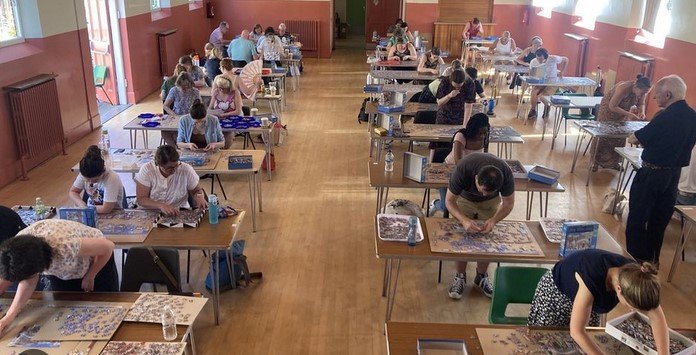Hosting a puzzle competition at home is a fun and engaging way to bring friends and family together. Whether you’re a puzzle enthusiast or just looking for a creative activity, a home-based puzzle competition can provide hours of entertainment. The key to hosting a successful event is preparation. In this article, we will guide you through the steps to organize and host a puzzle competition at home that will keep everyone excited and involved.

Choosing the Right Puzzles for the Competition
The first step in hosting a puzzle competition is selecting the right puzzles. You should choose puzzles that suit the participants’ ages and skill levels. If you’re hosting the competition for kids, jigsaw puzzles with large pieces or simpler crossword puzzles might be appropriate. For adults or seasoned puzzlers, consider more complex puzzles such as Sudoku, logic puzzles, or even escape room-style challenges.
To keep things exciting, consider offering a variety of puzzle types. For example, you could have teams work on different types of puzzles: jigsaw for visual thinkers, word puzzles for language lovers, and logic puzzles for problem-solvers. The key is to make sure there is something for everyone. You could also add a time challenge to increase the competitive element and make things more thrilling.
Setting Up the Competition Space
Once you’ve selected the puzzles, it’s time to prepare the space for the competition. Choose a large enough area where participants can work comfortably without distractions. Set up separate stations for each puzzle or team. If you have multiple participants, consider dividing them into smaller groups or teams. This encourages teamwork and fosters a more competitive environment.
Make sure each team has all the tools they need to complete their puzzles, such as pens, pencils, or markers for written puzzles. For jigsaw puzzles, provide enough table space for each team to spread out the pieces. If you plan to have timed rounds, make sure to have a clock or timer visible to all participants to keep track of the time limits. Setting up a comfortable and organized space will ensure the event runs smoothly.
Creating Rules and Scoring Guidelines
To ensure a fair and enjoyable competition, establish clear rules and scoring guidelines before the event starts. You can set up time limits for each puzzle, assign point values based on the difficulty level, and decide if there are any bonus points for creativity or teamwork. For example, a more difficult puzzle might be worth more points than an easier one, or you could award extra points for completing a puzzle ahead of schedule.
Additionally, ensure everyone understands the rules. Clarify whether participants can get help from others or if they must work independently. You may also want to include some fun variations, like “penalty rounds” where participants have to answer a related trivia question or “wild card” challenges that could boost their score. This will keep the competition dynamic and engaging throughout the event.
Encouraging Friendly Competition and Teamwork
One of the most enjoyable aspects of hosting a puzzle competition at home is fostering a spirit of friendly competition. Encourage participants to cheer each other on, share strategies, and help out when necessary. While the goal is to have fun, a little bit of competitive spirit can make the event more exciting.
If your competition involves teams, emphasize teamwork and communication. This can help participants develop new puzzle-solving strategies and make the event more collaborative. For example, one team member could work on assembling pieces for a jigsaw puzzle while another focuses on solving a crossword. Team-based events can be a great way to involve everyone, from puzzle novices to experts, and ensure that all participants are engaged throughout the event.
Exploring online content is engaging, and online pokies provide enjoyable breaks. Bonuses make gameplay even better. Check out https://www.newzealandcasinos.io/best-payout-casinos/ for thrilling fun. Media exploration and leisure blend perfectly.
Conclusion: Wrapping Up Your Puzzle Competition at Home
Hosting a puzzle competition at home is a great way to bond with friends and family while engaging in an intellectually stimulating activity. By carefully choosing the puzzles, setting up a comfortable space, creating clear rules, and encouraging teamwork, you can create an event that everyone will enjoy. Whether you’re hosting a casual get-together or a more serious competition, a home-based puzzle event can be a memorable experience that fosters creativity, collaboration, and a little bit of healthy competition.
Y4YY Entertainment
Y4YY.com features entertainment news and online media updates. Users may also engage with sports betting online for exciting digital experiences. It adds interactive value to the content.
Youth Empowerment and More
Explore resources and support for youth empowerment at Y4YY. For a different type of online experience, you can also try online blackjack.



